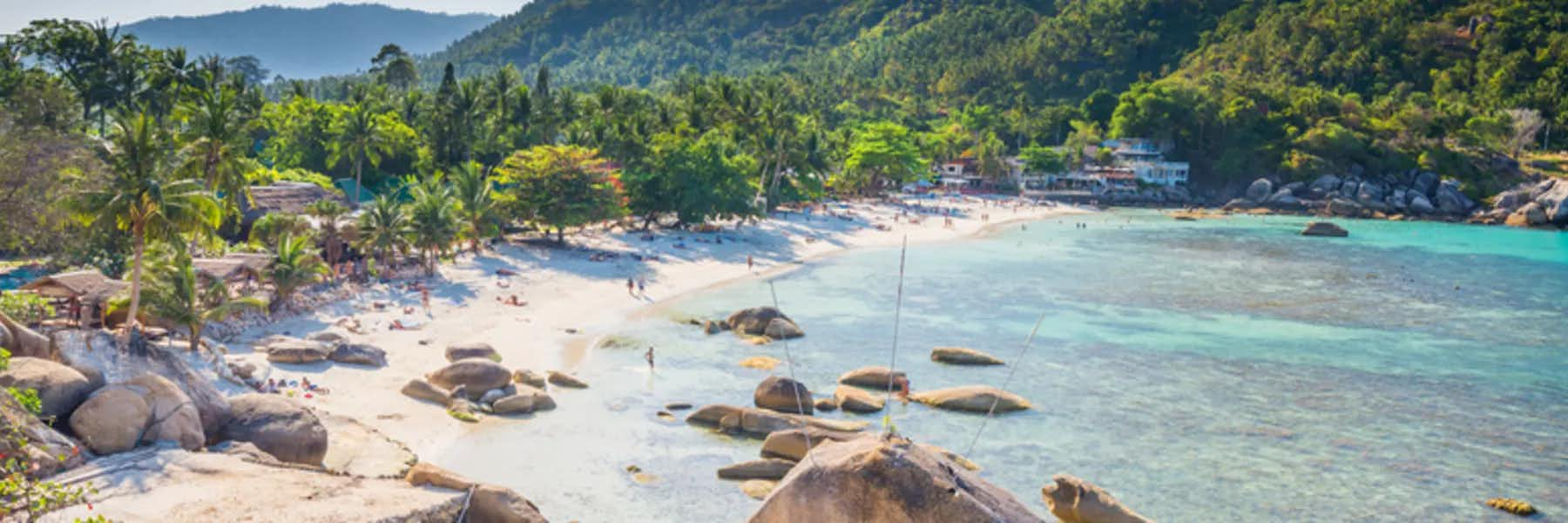Thailand is one of the world’s most popular locales for good living abroad. And there are lots of reasons why. For pennies on the dollar, you get a year-round tropical climate and access to modern comforts and conveniences, including affordable, high-quality medical care.
There’s something special about this corner of the world. It’s an exotic place—orange-robed monks collect alms at dawn—yet it’s easy to live a comfortable lifestyle, similar to that of the West, but without the headaches and extra expense. There is no doubt about it; this is a country with soul.
We dine out on delicious Thai food, go to the cinema for an English-language original, or take off for a beach weekend at a moment's notice. And the Thai people are some of the most welcoming in the world.
As expat, Pamela Manning, says: “The lifestyle here is vibrant, friendly, and rewarding. There is no way I could afford to get out so much if I didn’t live in Thailand. I can afford to go out every day, enjoy golf, lunches with other expats, and enjoy many local events. You can’t help but feel very alive here.”
And it’s beautiful. Think turquoise seas and white-sand beaches, jagged limestone cliffs, beach-rimmed islands, and mountainous jungle retreats. With that comes a whole range of lifestyle options. On a budget of around $2,000 a month including rent, a couple can live well anywhere in the country.
You’ll often hear newcomers express their surprise at how easy it is to acclimatize, to find First World comforts while still enjoying all the excitement of life in Asia…where ancient temples, golden Buddhas, and colorful markets are part of daily life. This is a place where ancient traditions, and colorful culture combine so that you can genuinely experience another culture, while still enjoying the comforts of home.
But where should you start looking? To help you find the perfect spot, here’s a rundown of the country’s most popular expat havens, as well as a couple of “off-the-grid” destinations for anyone seeking an extra dose of peace and solitude.
1. Chiang Mai: Mountain Views and a Slower Pace of Life
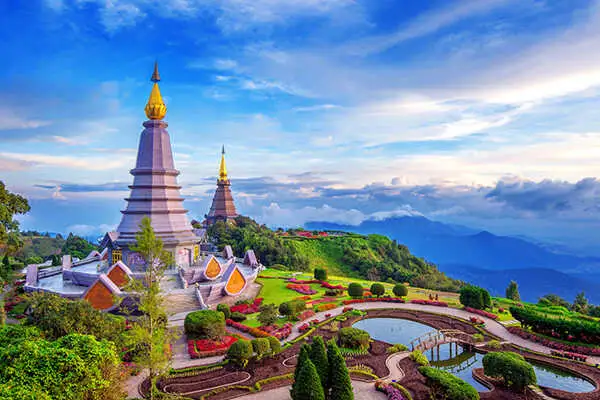
Located near the foothills of northern Thailand, an hour’s flight from Bangkok, Chiang Mai is popular for those seeking a calmer and more cultured way of life and the bonus of a more temperate climate.
As the center of northern Thai, or Lanna, culture, Chiang Mai is home to hundreds of Buddhist temples, with a rich history that dates back over 700 years. The reverence for this history, combined with a mountainside setting, helps give the area its unique feel. A moat still surrounds Chiang Mai’s historic core and the crumbling remains of this once-walled city evoke its exotic past.
With an average temperature of around 77 F during the cool season, Chiang Mai sees some of the country’s best weather. And here you have access to all of the modern conveniences and comforts of daily life, at some of the most reasonable prices in Thailand. You’ll find impressive dining options, movie theaters featuring first-run films, western-style malls, as well as a JCI-accredited hospital offering quality, affordable medical care.
Daryl Jones, who loved his holiday in Chiang Mai so much, made the move after retiring seven years ago. “My health insurance is Medicare and I don’t really use it. I do have international healthcare coverage, which takes care of my needs here. That takes care of my inpatient expenses. I usually pay outpatient expenses out of pocket because the cost of outpatient is relatively inexpensive, so it is easy to do.”
“I love having conversations with other people from different parts of the world in places like this (restaurant). There is such ambiance here and I can’t think of anywhere in Buffalo New York that compares to this. I love the tropical feeling with the lush vegetation going on. There are so many places with that feel in Chiang Mai. It is like you find little oases.”
Like any modern center, Chiang Mai is not without its challenges. During the hot season, local farmers burn to clear for new crops and this does impact upon the air quality. Although there are measures being taken to reduce the burning, some choose to travel during this time. Many expats live near the city center, and some single expats report living comfortably on as little as $1,500 a month. Studio apartment rentals in this area start at around $400 a month, and can be bought for just over $25,000 for a basic room with a kitchenette.
2. Koh Samui: A Tropical Island Haven
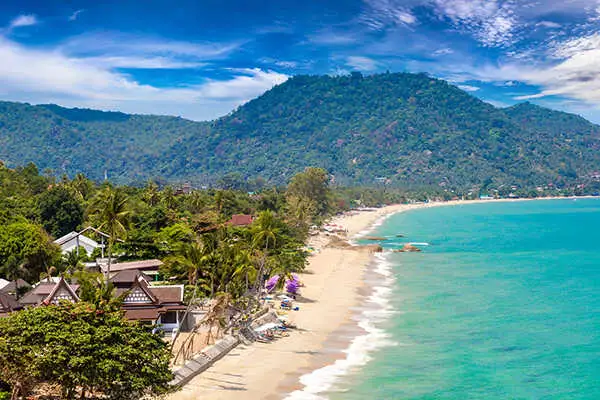
When it comes to the ideal beach lifestyle abroad, many expats look to Koh Samui, where the palm-lined beaches, Azure Ocean, year-round tropical weather, and affordable costs make for an ultra-easy living.
Just an hour-and-a-half flight from the Thai capital of Bangkok, this popular spot offers something for everyone, whether you dream of a tranquil seaside retreat or prefer frequent nights out on the town. You can access quality healthcare, where a basic doctor’s visit costs as little as $20, and there’s plenty to keep you busy—from yoga and Pilates to salsa dancing and bridge club—when you’re not soaking up the sun on one of the island’s many beaches.
Expats come to Koh Samui for the sea, sand, and sun, and they stay for the affordable, laidback lifestyle. “It’s like Hawaii, only easier,” says Sam Rogers, who’s originally from California. Or, as another resident expat put it, “You can get away from it all…find a quiet beach and enjoy the surf or sunset…or you can join any form of entertainment or adventure, from zip-lining to chartering your own sailboat.”
Home to over 63,000 people, Samui has been dubbed “Coconut Island” for a good reason—along with tourism and fishing; coconuts form a major part of its economy. Around 2 million are exported to Bangkok and the Thai mainland each month, most of them picked by specially trained monkeys. Two million coconuts may sound like a lot, but they are also used to produce coconut oil and coconut cream, essential ingredients in Thai cooking.
And due to Koh Samui’s affordability, it’s easy to enjoy the splendors of the local cuisine. International Living Contributor Michelle Stevenson says “ ‘Living in Koh Samui combines the best of everything—beautiful beaches, fantastic food…the seafood is the freshest I’ve ever eaten and, best of all, the cheap cost of living Thailand is known for. My husband and I lived in Koh Samui for two months, regularly treating ourselves to cocktails for $2.28 and mouth-watering dishes for as little as $1.63. We paid half the rent we would’ve paid back home—and our accommodation included a pool, tennis court, gym, and restaurant. Everything you need is here, including coffee shops, shopping malls, and all the other necessary Western conveniences. We’ll definitely be heading back to Koh Samui in the future— it’s a low-cost island paradise’
Get Your Free Report on the World's Best Places to Retire in 2025
Get Your Free Report on the World's Best Places to Retire in 2025
Simply enter your email address below to sign up for our free daily postcard e-letter and we'll also send you a FREE report on The World's Top 10 Retirement Havens for 2025.

By submitting your email address, you will receive a free subscription to IL Postcards and special offers from International Living and our affiliates. You can unsubscribe at any time, and we encourage you to read more about our Privacy Policy.
3. Bangkok: Modern and Affordable
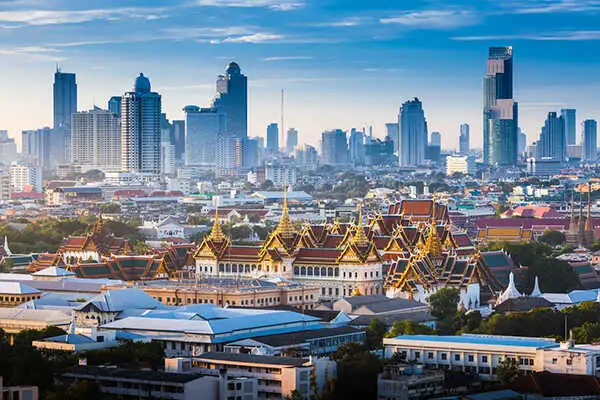
Thailand’s capital, a former Chinese trading port situated along the banks of the Chao Phraya River, has long attracted expats. Earning its place in history as an “R&R” spot for American troops serving in the Vietnam War, Bangkok has flourished into a modern and cosmopolitan city, with gleaming skyscrapers, luxury hotels, and world-class public-transit options. Today, expats flock here for the multicultural vibe and high on convenience, easy on the wallet living.
For less than $2, you can dine on a bowl of noodles at some of the best street-food stalls in Asia….or spend $150 or more and indulge in a five-star meal at your pick of the city’s classiest restaurants. Enjoy live music in the city’s pubs or take in views of the skyline from one of many popular rooftop bars. The capital also boasts some of the region’s best shopping, including a multitude of markets, North American-style malls, and boutiques.
The city’s large concentration of foreigners, or farang, means there’s no shortage of social clubs and activities for interests as varied as tennis, language study, and theater. In fact, international tours such as ballet, musicals, and contemporary artists make this city a global cultural hub. Bangkok is home to many of the country’s top doctors and private hospitals, and local expats appreciate the astonishingly affordable costs for top-quality care. For example, you can see a specialist for less than $60.
A majority of Bangkok’s expats choose to live in the heart of the city, along public transportation routes that ease getting around in what is one of Southeast Asia’s largest cities. Sukhumvit Road, one of the main thoroughfares, is a popular choice for its proximity to the elevated “Skytrain” and the MRT underground. Here you’ll find some of the best condos, restaurants, night spots, and shopping, including a large concentration of professional tailors.
Those who prefer a little more elbow room settle in Bangkok’s various suburbs, such as Bang Na and Nonthaburi, both less than 20 miles from the city center.
“I see blue skies often,” says Kim McGrail, who’s lived with her husband Rob part-time in a riverside condo in Nonthaburi for 15 years. “We have views of Bangkok in the distance.” Bangkok’s proximity to the coast, as well as a variety of regional attractions, is another reason the McGrails chose Thailand as their home away from home. “I love that we can get to Vietnam and Cambodia in an hour and a half or less,” says Kim.
Due to Thai law restricting the purchase of land and homes in the country, condominiums are a popular choice. A modern, 1,119-square-foot, two-bedroom, fully-furnished condo in Rama III—with stunning views over the Chao Phraya—is listed at $731 a month. If you’re looking for something bigger, you can rent a three-bedroom, three-bathroom home with 2,368 square feet near an international school for $984 a month.
4. Hua Hin: Relaxed Seaside Retreat
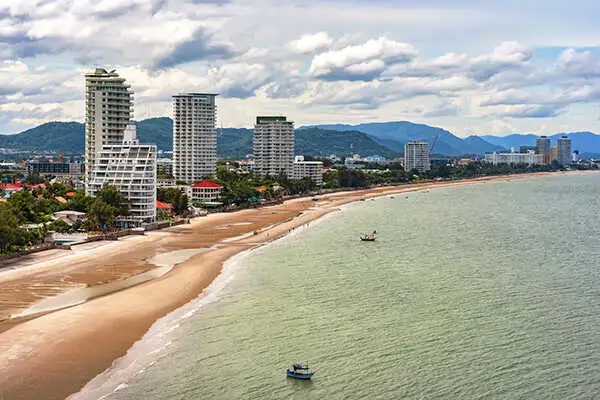
This once-quiet fishing village south of Bangkok first debuted as a beach getaway in the 1920s, when Thailand’s royal family built a summer palace on the shore. Soon, the Thai capital’s elite followed suit, establishing vacation homes on the area’s wide, sandy beaches. Today, an easy, two-and-a-half-hour drive from Bangkok, Hua Hin is known among expat circles as a lively seaside town with easy living, a burgeoning restaurant scene, and a taste of the good life. The new direct flights from Bangkok to Hua Hin are an added bonus for busy expats.
In addition to long stretches of clean, beautiful beaches, there’s a great night market right in town, where you can buy inexpensive bags and Thai handicrafts. Get your shopping fix, and then stop at one of the area’s seafood stalls for the day’s freshest catch. Or head a few blocks east where you can dine wharfside by candlelight and take advantage of fresh seafood Water sports and other beach activities like flying kites are on offer if you wish to really get into the local beach landscape.
For more than a decade, Hua Hin has hosted an annual jazz festival right on the beach, featuring some of the finest local and international musicians. And in recent years, the area has seen the establishment of a successful local winery that is open for tastings. (That’s right…the Thai’s are now making wine and it’s not bad)
Expats appreciate Hua Hin’s small-town feel. And while the area’s proximity to Bangkok initially draws people here, the sea breezes and reasonable cost of living are what convinces them to stay.
As in many parts of Thailand, there’s local access to quality, affordable medical care. Most expats seek care at the area’s private hospitals, including the recently opened Bangkok Hospital Hua Hin, a satellite center of the well-known hospital located in the capital.
John Carr lives and works in Bangkok, but spends as many weekends as possible at the condo he purchased 12 years ago, halfway between Hua Hin and Cha’am, located 15 miles to the north. “It’s a great chance for me to relax,” says John. “The beaches are excellent and fairly quiet,” John admits the area has seen growth and many changes over the years. Still, he says, “Hua Hin is an easy-going town with lots of things to do.”
In terms of cost of living a single expat can live in Hua Hin on a monthly budget of $1,100 including rent and the delights of local food and let’s face it… the views of the beach are priceless.
5. Phuket: A Beach Lifestyle with All the Amenities
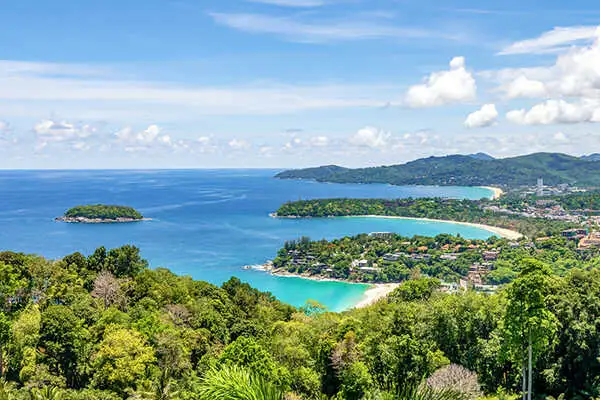
Nothing quite prepares you for the beauty of Phuket, especially when approaching the region by air…the sparkling, turquoise waters and jungle-topped mountains, the rocky outcrops, and the white-sand beaches. The country’s largest island is a paradise for many expats.
This is Thailand’s largest island, so you truly choose your own adventure here.
Dubbed the “Pearl of the Andaman,” the island’s surrounding waters are warm and clear and there’s an ever-present breeze. During the dry season, daytime temperatures average in the 70s F.
Phuket offers an easy-going lifestyle, or a club-hopping, center-of-the-action one, depending on your preference. For instance, you can go for a swim and a relaxing lunch on quiet Naithon Beach or you can join the buzz in the bar-lined Patong area, where music throbs and cabaret shows continue into the night. And with Thailand’s second-busiest international airport, you can easily catch a flight to a range of destinations, without transiting through Bangkok.
But the biggest draw for many expats is the comfortable, convenient lifestyle. In Phuket you can enjoy some of the best seafood in the south of the country and dine at a range of gourmet restaurants, from sushi to Italian, to Indian. You’ll find grocery stores stocking imported foods, fashion and furniture boutiques, and golf courses galore. Expat clubs welcome newcomers and offer everything from cycling to sailing, and access to top-notch medical care is a reality here, at a fraction of the cost of back home.
It is this quality of life that drew Paul and Mary Farrell to the region. Originally from Canada, the couple vacationed frequently in Thailand over the years, and retired in 2010 to live full-time in Phuket. “After living in the cold of Canada for most of my life, it is nice to be living in a warm climate—I enjoy walking on the beach and sunset dinners,” says Paul. The couple dines out often, which Paul says is “very reasonably priced and delicious.”
Today, little trace is left of the impact of the 2004 tsunami, which devastated Phuket and other locations on Thailand’s western coast. Resorts are now back to full capacity, many of which took the opportunity to renovate and upgrade their facilities following the destruction. Since the tragedy, a tsunami warning system has been established in the area to increase safety.
Phuket’s expats live in a variety of towns and villages. The Patong area does earn its reputation as a seedy locale for tourists and “sex-pats,” but that’s just one part of the island. In fact, you’ll find in Phuket a very nice range of “family-friendly” locales like Chalong and the Nai Harn/Rawai area.
But whatever your budget, there’s something for everyone—and couples report living well on around $2,200 a month, all in. A brand new, fully furnished, two-bedroom condo, a 5-minute walk from the marina can be found for as little as $ 915 a month. Or choose a fully furnished, two-bedroom bungalow with two en-suite bathrooms, a garden, and a terrace for $890.
There is no doubt, that if you choose to live in Thailand, there are so many adventures to be had. The country is rich in short-stay places so that you can experience a variety of landscapes, stunning views, and intense flavors at a fraction of what you would pay at home.
Related Articles
The Best Beaches in Thailand for the Perfect Retirement by the Sea
